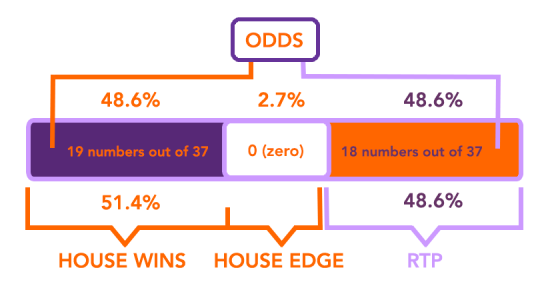Your chance of winning. The odds of winning. The house edge. RTP. These are all words you will regularly come across in the gambling world, whether you spend time in land-based casinos or prefer to do your playing from the comfort of home at an online casino.
Home » Latest news » Difference between chance, odds, house edge and RTP
What do these words actually mean? Is there any difference between them? Are they all referring to luck?
These are questions that are frequently asked by novice players, but just as frequently misunderstood by experienced gamblers. While they all have the same base root – probability – how they affect your play can be quite different.
Chance, odds, house edge and RTP all refer to the probability of an outcome: the probability of winning versus the probability of losing. Probability itself refers to the mathematics that predict and describe how likely it is that a specific event will occur.
The higher the probability, the more likely it is that the event will take place.
Take the weather for example. If it is a very cloudy day, with dark and low-hanging clouds, it is far more probable that it will rain than if it was a bright, sunny day with not a cloud in sight.
While luck plays a huge role in gambling, the ideas of chance, odds, house edge and RTP (probability, in a nutshell) have nothing to do with luck. They are very much mathematics and statistics based, a scientific model rather than an immeasurable phenomenon.

Chance – the probability of something happening, e.g.: there is a chance you’ll win the game.
Chance is quite difficult to pin down. It has a number of meanings depending on the context but, in the world of gambling, it is most commonly associated with odds. If, for example, your chance of winning is 25% it means you have a 1 in 4 chance of getting the result you want.
Let’s use a coin toss as a basic example. If you flip a coin, the chances of it landing on heads is 1 in 2 or 50%. So you have a 50% of winning of you were betting on heads.
Odds – the ratio of the probability of an event happening to that of it not happening.
Like chance, odds are related to probability. Odds are a more mathematical representation of the chance of something happening versus it not happening.
In our coin example, the odds of getting heads would be 1:1 or 1 chance of getting heads versus 1 chance of getting tails.
As the factors affecting the outcome increase, so does the ratio. Throwing a six-sided die and betting on getting a 6, for example, would give you odds of 1:5. You have 1 chance of getting a 6 versus 5 chances of getting a number from 1 to 5. If you were to bet on getting a 5 or a 6 your odds would be 2:4 or 2 chances of getting your chosen number (5 or 6) and 4 chances of getting a number from 1 to 4.
In gambling, odds are also used to refer to your payout, but that is a subject for another article.
House edge – the percentage reflecting the advantage that a particular casino game has over the player.
You’ve heard the saying “the house always wins”. The house is the casino. The house edge is the built-in advantage that the casino has on all games. This can be a small percentage in games like blackjack or quite a substantial advantage in games like Keno.
House edge is also how the casino know they can make a profit because it’s a small mathematical or game play advantage. Take blackjack for example. Blackjack usually has a house edge of less than 1%. How does the house get an advantage? By letting the player play first. The player takes all the risk by making choices first. Some of these choices may lead to a bust. Some of the choices may lead to the player standing on a number the dealer can beat. This is the edge the house has, knowing the goal to beat.
RTP or Return To Player – a measure of the percentage of stakes a game returns to players.
This is the mathematical calculation of how much the casino can expect to pay back to the player over an extended period of time. It is another side of the house edge coin.
An RTP of 98%, in theory, means that over an extended period a player can expect to make back 98% of their bets. In simple terms, a 98% RTP means that a player betting R100 can expect to get R98 back.
In house edge terms it means the house edge is 2%.
Just a note: when we speak of a long period of play, we are talking, on average, a million plays. So a million spins of a slot or a million hands at the tables.
Let’s use European roulette as an example for all these terms.
A European roulette wheel has 37 pockets numbered from 0 to 36. 0 is green. The numbers 1 to 36 alternate between black and red (1 red, 2 black, 3 red, 4 black, etc.).
Players can bet on a single number, a selection of numbers, red/black, odds/evens and more.
A basic bet would be a bet on red or black. In theory this is a 50/50 but the 0 pocket throws an advantage to the house and changes the odds in their favour.
We bet on black. How does this affect odds, house edge and RTP?
From the 37 available pockets, 18 are black. This means the odds of us winning are 18:37. The odds of us losing are 19:37. We have 18 possible black pockets from a total of 37 pockets for a win. But there are a total of 18 red + 1 green pocket from a total of 37 for a loss.
There is a 48.6% chance of the ball landing on black. There is a 48.6% chance of the ball landing on red. And there is a 2.7% chance of the ball landing on 0.
Odds of winning 18:37 or 48.6%
Odds of losing 19:37 or 51.4%
House wins 51.4%
House edge 2.7%
RTP 48.6%

Knowledge is power and knowing how chance, odds, house edge and RTP work can help you play a more strategic game or even choose games that give you a better chance of winning.
While these games have the lowest house edge, you still need to have a basic understanding and strategy when playing.
| Cookie | Duration | Description |
|---|---|---|
| cookielawinfo-checkbox-analytics | 11 months | This cookie is set by GDPR Cookie Consent plugin. The cookie is used to store the user consent for the cookies in the category "Analytics". |
| cookielawinfo-checkbox-functional | 11 months | The cookie is set by GDPR cookie consent to record the user consent for the cookies in the category "Functional". |
| cookielawinfo-checkbox-necessary | 11 months | This cookie is set by GDPR Cookie Consent plugin. The cookies is used to store the user consent for the cookies in the category "Necessary". |
| cookielawinfo-checkbox-others | 11 months | This cookie is set by GDPR Cookie Consent plugin. The cookie is used to store the user consent for the cookies in the category "Other. |
| cookielawinfo-checkbox-performance | 11 months | This cookie is set by GDPR Cookie Consent plugin. The cookie is used to store the user consent for the cookies in the category "Performance". |
| viewed_cookie_policy | 11 months | The cookie is set by the GDPR Cookie Consent plugin and is used to store whether or not user has consented to the use of cookies. It does not store any personal data. |